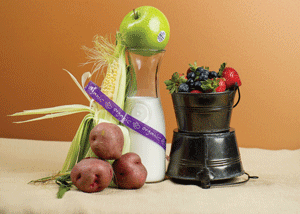 Since the Precious Jewels and their raging appetites — not to mention the equally voracious hungers of their 20-something chums — have left the nest, I have had to adjust. Some days I open the fridge to find not much more than limp greens, half and half for my coffee and shelves of condiments, some of which might be old enough to vote.
Since the Precious Jewels and their raging appetites — not to mention the equally voracious hungers of their 20-something chums — have left the nest, I have had to adjust. Some days I open the fridge to find not much more than limp greens, half and half for my coffee and shelves of condiments, some of which might be old enough to vote.
In other words, less is actually less.
So what do I do on those occasions? I do what you likely do as well. I jump in Station Wagon #7 and head for the neighborhood grocery store. If I am really organized, I take a list of items that would make my fridge and my cabinets more appealing to all concerned, including me.
This is easy for most of us because we have convenient transportation and do not live in food deserts.
Say what?
Food desert is a relatively new term, apparently coined in a 1995 British nutritional task force report and referring to “populated areas with little or no food retail provision,” meaning areas where people live but have little access to fresh food. There may be convenience stores and fast food outlets but no real groceries, supermarkets or famers markets. Quality food access becomes even more of an issue if you are a young child, disabled or elderly or if you have no transportation, which makes even getting to what food is available a problem.
The result is that even when people understand healthy eating and want to do that, there is little opportunity, and their diets and overall health suffer for that lack.
There are basically two kinds of food deserts — urban and rural. Urban food deserts are defined as no retail supermarket within a mile of one’s home, and rural food deserts have none within 10 miles of one’s home.
From my house in the Haymount section of Fayetteville, that would mean no grocery store between home and downtown or home and Raeford Road and Purdue Drive. Blessedly, there is one, and I am there several times a week but it would be a definite hike if I had to walk it and then carry my groceries home. If we pretend for a moment that my house were in a rural food desert, that would mean no supermarket between my house and almost Hoke County. There is no way I could get there without my car, much less get the goodies home.
So why do we have food deserts?
There are many reasons, and they are largely economic. Groceries and supermarkets, as wonderful and healthy as they may be, are at their core businesses, which must be profitable to survive. They need to be in areas with enough people to buy their food and in areas where people can afford their food. The cold, hard and unfortunate truth is that fresh healthy food is more expensive than processed, packaged food. Hence, supermarkets tend to be in suburban neighborhoods. In addition, there are sometimes issues of cultural differences, crime rates and others that discourage supermarkets from locating in certain neighborhoods, which contributes to the creation of food deserts.
The Internet is loaded with sites showing food deserts all over the nation, including in North Carolina. While I have lived in urban or suburban locales all my life, this is certainly something I would look at before I decamped to a rural area or an urban center with which I was not familiar. The U.S.
Department of Agriculture is a good place to start.
Food deserts are one of the reasons I have followed the long-running saga of farmers markets in Fayetteville and Cumberland County. With no permanent home identified, different markets are popping up in various parts of our community — Murchison Road, Ramsey Street and elsewhere, along with the more established one in downtown. While they are small and seasonal, they are also opportunities for local residents to buy locally grown and produced fruits, vegetables and occasionally meats. There is also at least one home delivery service available in our community. The additional products offered in these venues, including homemade baked and canned goods as well as crafts, are bonuses.
No one has come up with a solution to food deserts, but it is clear that the answer lies in being able to distribute quality foods at affordable prices to people who live in rural areas and to those who are not particularly mobile or who lack transportation.
So, why should people who do have transportation and who do live in proximity to groceries and supermarkets with fresh, high-quality food worry about food deserts? Why should people like you and me care about this? It should matter to us because poor health affects all of us in higher medical costs and in a less productive and prosperous community.
If fresh, high-quality food is available, I believe that most people will try to do the right thing for themselves and their families.

 How to resolve AdBlock issue?
How to resolve AdBlock issue? 








